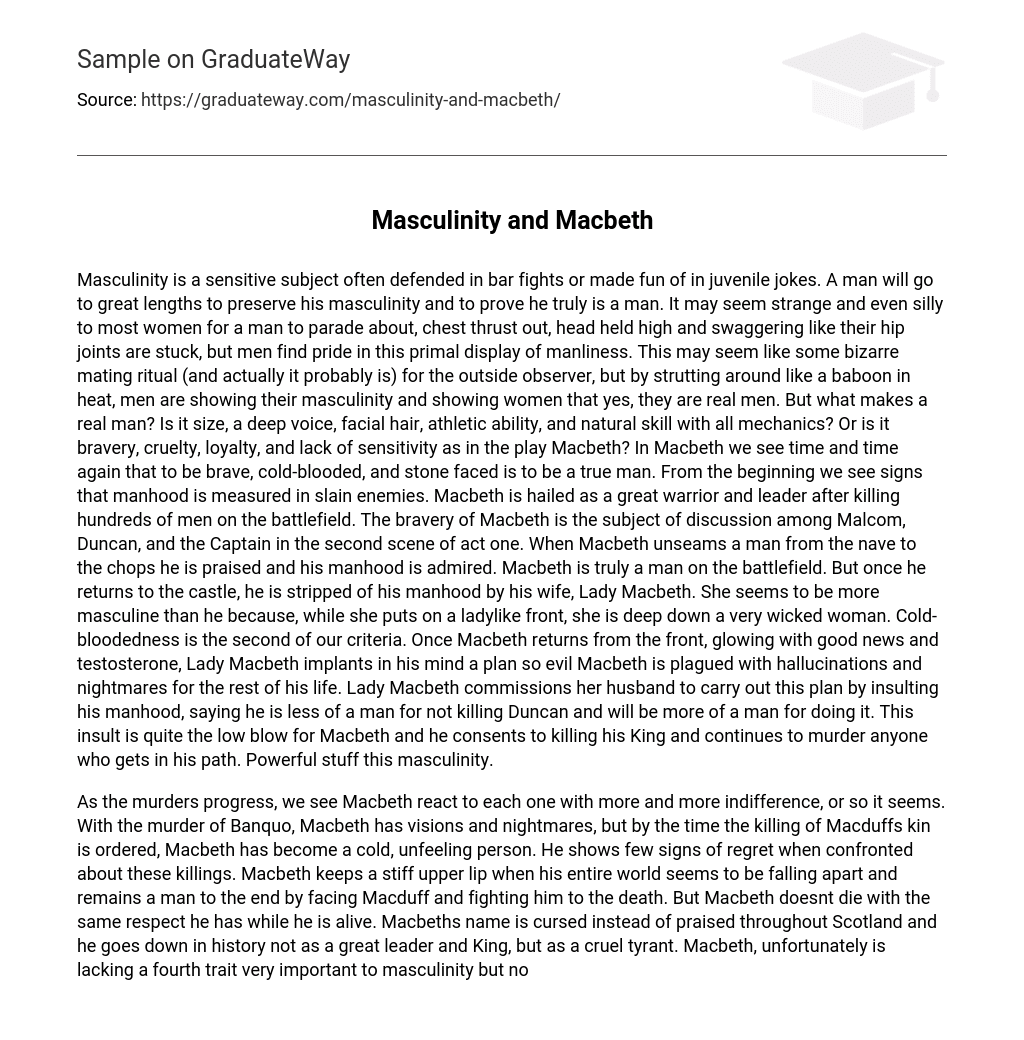Masculinity is a sensitive subject often defended in bar fights or made fun of in juvenile jokes. A man will go to great lengths to preserve his masculinity and to prove he truly is a man. It may seem strange and even silly to most women for a man to parade about, chest thrust out, head held high and swaggering like their hip joints are stuck, but men find pride in this primal display of manliness. This may seem like some bizarre mating ritual (and actually it probably is) for the outside observer, but by strutting around like a baboon in heat, men are showing their masculinity and showing women that yes, they are real men. But what makes a real man? Is it size, a deep voice, facial hair, athletic ability, and natural skill with all mechanics? Or is it bravery, cruelty, loyalty, and lack of sensitivity as in the play Macbeth? In Macbeth we see time and time again that to be brave, cold-blooded, and stone faced is to be a true man. From the beginning we see signs that manhood is measured in slain enemies.
Macbeth is hailed as a great warrior and leader after killing hundreds of men on the battlefield. The bravery of Macbeth is the subject of discussion among Malcom, Duncan, and the Captain in the second scene of act one. When Macbeth unseams a man from the nave to the chops he is praised and his manhood is admired. Macbeth is truly a man on the battlefield.
But once he returns to the castle, he is stripped of his manhood by his wife, Lady Macbeth. She seems to be more masculine than he because, while she puts on a ladylike front, she is deep down a very wicked woman. Cold-bloodedness is the second of our criteria. Once Macbeth returns from the front, glowing with good news and testosterone, Lady Macbeth implants in his mind a plan so evil Macbeth is plagued with hallucinations and nightmares for the rest of his life. Lady Macbeth commissions her husband to carry out this plan by insulting his manhood, saying he is less of a man for not killing Duncan and will be more of a man for doing it. This insult is quite the low blow for Macbeth and he consents to killing his King and continues to murder anyone who gets in his path.
Powerful stuff this masculinity. As the murders progress, we see Macbeth react to each one with more and more indifference, or so it seems. With the murder of Banquo, Macbeth has visions and nightmares, but by the time the killing of Macduffs kin is ordered, Macbeth has become a cold, unfeeling person. He shows few signs of regret when confronted about these killings.
Macbeth keeps a stiff upper lip when his entire world seems to be falling apart and remains a man to the end by facing Macduff and fighting him to the death. But Macbeth doesnt die with the same respect he has while he is alive. Macbeths name is cursed instead of praised throughout Scotland and he goes down in history not as a great leader and King, but as a cruel tyrant. Macbeth, unfortunately is lacking a fourth trait very important to masculinity but not always so obvious: loyalty. It is the lack of loyalty that makes Macbeth despised in death and loyalty that immortalizes Siwards son as a man. This loyalty is the tie that binds and without it no one can truly be a man.
Macbeth tries his whole life to show that he is a man. He fights bravely on the battlefield, he commits dastardly deeds against his kinsmen and leaders, and he does so without shedding a tear. However, Macbeth dies hated by many and loved by few. This leads one to ask yet again, What makes a real man? If a guy cant earn his man badges by disemboweling a few people, how will he ever succeed? Women might argue that a real man needs to be sensitive yet strong, open yet mysterious, athletic yet artistic, and clever yet simple. But it seems that women got into trouble with the whole Womens Lib thing and should maybe sort that mess out before they start telling others what to do.
So as the search for true manhood continues, we must bear with these strutting males and just be thankful they arent unseaming anyone to prove themselves to us.





